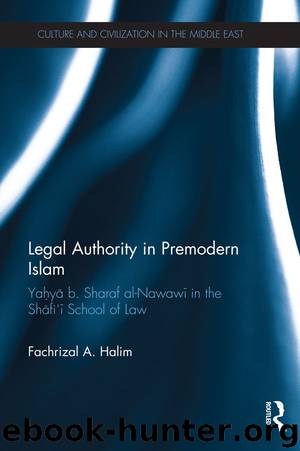Legal Authority in Premodern Islam by A. Halim Fachrizal

Author:A. Halim, Fachrizal.
Language: eng
Format: epub
Publisher: Taylor & Francis (CAM)
Al-Nawawī’s reconciliation of the ṭarīqas
Having identified the different doctrinal elaborations of each ṭarīqa, we shall now discuss how al-Nawawī reconciled these ṭarīqas with the madhhab. What I mean by the phrase “reconciliation of the ṭarīqas” in this section is to bring the legal elaborations of the ṭarīqas in line with the hermeneutic principles of al-Shāfiʿī, that is, with the true yardstick of the madhhab. Before moving further, however, one must also note that the initiative to harmonize legal elaboration of the ṭarīqas was not original to al-Nawawī. Two centuries before al-Nawawī, Abū ʿAlī al-Sinjī al-Marwazī (d. 427 [430]/1036 [1039]), who happened to be a student of Abū Bakr al-Qaffāl al-Ṣaghīr and Abū Ḥāmid al-Isfarāyīnī, respectively the leaders of the community of the Khurasanian and Iraqian jurists, had begun the initiative to reconcile the teachings of his teachers with the madhhab.89 Tāj al-Dīn al-Subkī, in his Ṭabaqāt, notes that Abū al-Ḥasan al-Būshanjī (d. 467/1075) was also known to have reconciled in his doctrine the two ṭarīqas after he studied with his teachers from both ṭarīqas. As al-Subkī’s phrase has it: “I don’t think there was any other Shāfiʿite jurist who integrated [the differences of the two ṭarīqas] in his work as did al-Būshanjī.”90
Another excellent case in point was Abū Muḥammad al-Mūṣilī al-Muʿāfī (d. 630/1233), who was known to have attempted to reconcile the doctrines of both ṭarīqas (kutub al-ṭarīqayn) as reflected in his work Kitāb al-Kāmil fī-l-Fiqh.91 Yet another was al-Rāfiʿī, who, through his work Fatḥ al-ʿAzīz (the subject of al-Nawawī’s commentary), was also reported to have intimately reconciled the two ṭarīqas.92 In his Tahdhīb, as has been seen, al-Nawawī expressed his fondness for those of his teachers who happened to study with Ibn al-Ṣalāh, because the latter was known to have inherited the learning tradition from the ṭarīqas of both the Khurasanian and Iraqian jurists.93 The number of Shāfiʿite jurists who attempted to bridge these ṭarīqas reflects the constant need of early scholars to reduce the differences over legal methods and doctrines in the madhhab. This concern was apparently aimed at facilitating day-to-day legal inquiries, that is, to make it clear on what basis rulings had been made, or whose legal opinions among the scholars of each ṭarīqas were considered authoritative.
There is no doubt that al-Nawawī’s reconciliation of the ṭarīqas of the Iraqian and Khurasanian jurists was motivated by the same concern to facilitate daily legal reference. In order to do so, he delved into the writings of each ṭarīqa, followed their reasoning and legal analysis, and finally, came up with his own position, which he framed as representing the position of the Shāfiʿī school. Among the representatives of the ṭarīqas of the Khurasanian and Iraqian jurists, he considered al-Ghazālī and al-Shīrāzī to be the two most important authors. The works of these two authors were known to have been very popular as object of study and memorization among students of law. Of al-Shīrāzī’s works, he considered al-Muhadhhab and al-Tanbīh as the two most important juristic works for the Iraqian
Download
This site does not store any files on its server. We only index and link to content provided by other sites. Please contact the content providers to delete copyright contents if any and email us, we'll remove relevant links or contents immediately.
The History of Jihad: From Muhammad to ISIS by Spencer Robert(2618)
Nine Parts of Desire by Geraldine Brooks(2355)
The Turkish Psychedelic Explosion by Daniel Spicer(2352)
The First Muslim The Story of Muhammad by Lesley Hazleton(2263)
The Essential Rumi by Coleman Barks(2042)
1453 by Roger Crowley(2022)
The Last Mughal by William Dalrymple(1854)
Trickster Travels: A Sixteenth-Century Muslim Between Worlds by Davis Natalie Zemon(1839)
Muhammad: His Life Based on the Earliest Sources by Martin Lings(1644)
God by Aslan Reza(1639)
by Christianity & Islam(1627)
A Concise History of Sunnis and Shi'is by John McHugo(1563)
No God But God by Reza Aslan(1536)
Magic and Divination in Early Islam by Emilie Savage-Smith;(1533)
The Flight of the Intellectuals by Berman Paul(1501)
Nothing to Envy by Barbara Demick(1444)
Art of Betrayal by Gordon Corera(1428)
What the Qur'an Meant by Garry Wills(1390)
Getting Jesus Right: How Muslims Get Jesus and Islam Wrong by James A Beverley & Craig A Evans(1334)
